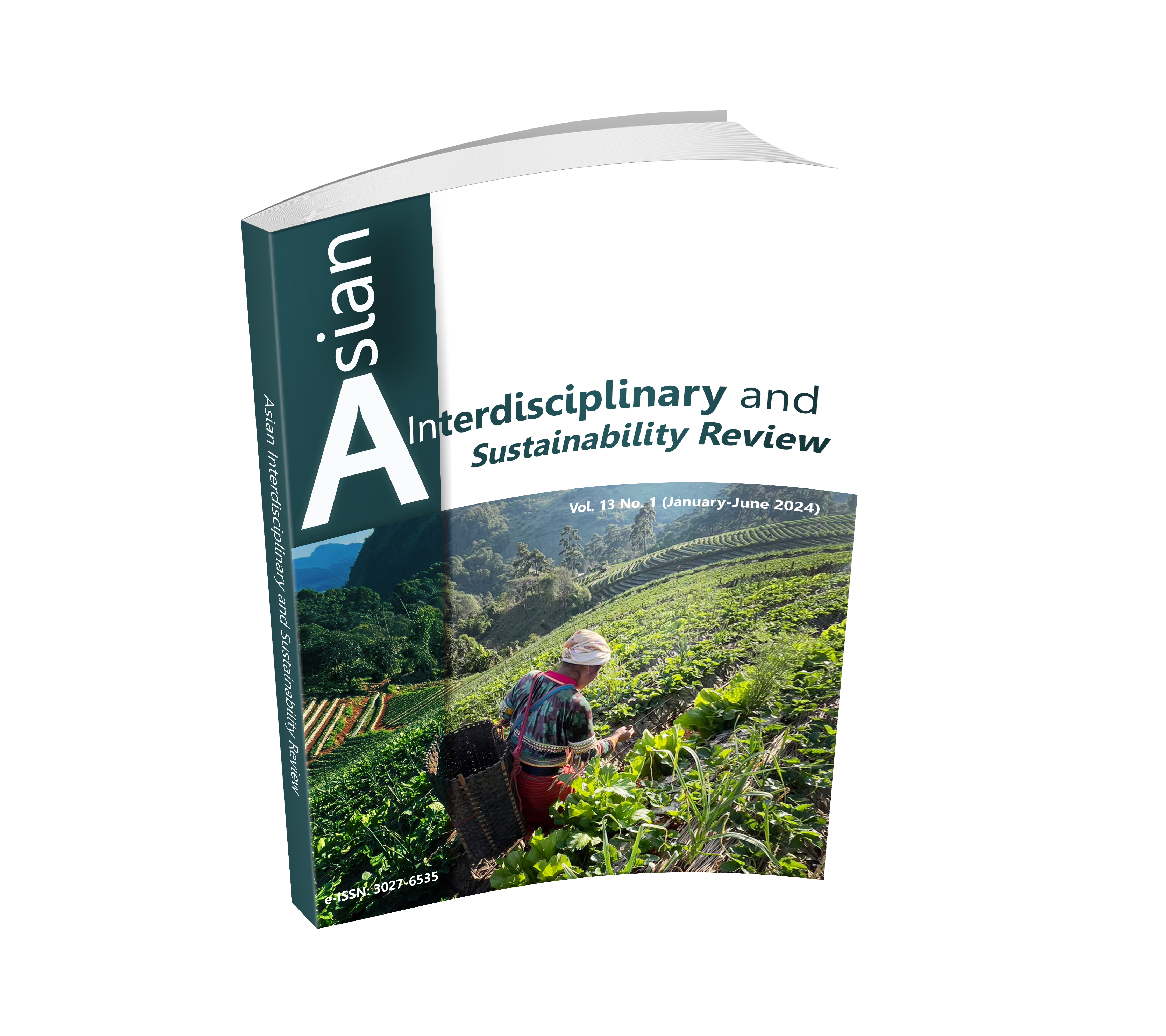INTEGRATING DIGITAL FLIPPED CLASSROOM WITH STUDENT TEAM ACHIEVEMENT DIVISION APPROACH TO IMPROVE ENGLISH READING SKILLS
DOI:
https://doi.org/10.14456/aisr.2024.1Keywords:
Student Team Achievement Division, Digital Flipped Classroom, English Reading SkillsAbstract
This quantitative research aimed to investigate integrating digital flipped classroom with student team achievement division (STAD) approach to improve English reading skills of undergraduate students and to compare the achievement pre-test and posttest of students in the experimental group. The third purpose was to compare the achievement pre-test and posttest of students in the control group and the last purpose was to compare the achievement in English Reading Skill between the experimental group and the control group. The sample was undergraduate students in Rajamangala University of Technology Tawan-ok, Thailand. They were divided into two group: 50 for experimental group and 50 for control group by purposive sampling who enrolled in English for study skills course. There were two equipment such as English reading program (3 lessons) and three lesson plans for STAD. The results found firstly students in experimental group who studied English reading program before doing STAD for improving their reading skills had higher academic achievement in posttest than the control group who hadn’t studied the English reading program before doing STAD in classroom with statistical significance at the level of 0.05. Secondly, students who studied STAD technique to develop English reading skills had significantly higher academic achievement after studying than before studying at the level of 0.05. Finally, the academic achievement of the experimental group was significantly higher than the academic achievement of the control group at the level of 0.05.
Downloads
References
Aporbo, R. (2023). Impact of Cooperative Learning Strategy on Students’ Academic Productivity. Journal of Student and Education, 1(1), 16-26.
Arigato, H. (2022). Learn Small: A-Level Writing Paragraph Organization Technique. Retrieved from www.altv.tv/content/altv-news/63622469b20f4ed7b66cb303.
Bagais, N. (2023). The Effects of Contextual Clues on Incidental Vocabulary Learning. Journal of Applied Linguistics and Language Research, 10(3), 21-39.
Casey, M. (2022). Inference in reading comprehension. Retrieved from https://bedrocklearning.org/literacy-blogs/inference-in-reading-comprehension.
Chankit, M., Suaysuwan, N., & Takong, T. (2018). Effects of Using STAD Cooperative Learning Activities on Reading Skills of Students of Rajamangala University of Technology Tawan-ok. Journal of Rajabhat Rajanagarindra University Graduate School, 2(1), 17-24.
Juntong, M., & Channuan, P. (2020). The Effects of the STAD Cooperative Learning Technique Using Graded Readers on First-Year English Major Students’ Reading Comprehension and Satisfaction at Rajamangala University of Technology Lanna Tak. The Golden Teak: Humanitu and Social Science Journal, 26(1), 63-74.
Kitkhunnatham, L. (n.d.). Pronoun Reference. Prachuap Khiri Khan: n.p.
Kongprachan, W. (2019). "21st Century skills": Survive even when humanity's position is shaky in a digital world that doesn't go backwards. Retrieved from www.nectec.or.th/news/news-pr-news/21st-centuryskills.html.
Kurniawan, D. (2021). Improving students’ motivation on learning English through student teams-achievement divisions method. Journal of English Education Literature and Linguistics, 4(1), 96-108.
Lertworaruttikul, P. (2020). English Reading Skill Development with Cooperative Learning Of Students at Rajamangala University of Technology Thanyaburi. Journal of Liberal Arts RMUTT, 1(2), 73-81.
Mathung, K. (2019). Developing reading comprehension abilities of Mathayom 1 students at Khun Krai Pittayakhom School by using reading comprehension exercises. Sukhothai: Khun Krai Pittayakhom School.
Miller, G. (1963). Language and Communication. New York: McGraw-Hill Book.
Ministry of Education. (2008). Basic Education Core Curriculum 2008. Bangkok: Ministry of Education.
Ministry of Higher Education, Science, Research and Innovation. (2023). Higher Education Plans to Produce and Develop the Country's Workforce 2023-2027. Retrieved from www.mhesi.go.th/index.php/news-and-announce-all/pr/announcement-news/8464-2564-2570-2566-2570.html.
Montri, N. (2018). Manual for Recruiting Assistant Teachers Majoring in Thai Language. Bangkok: Hi-Ed Publishing.
Naemkhunthod, P. (2018). Student Team Achievement Division (STAD). Retrieved from https://045piyaphonnaemkhunthod.blogspot.com/2018/08/studentteam-achievement-division-stad.html.
Naowanondha, A. (2014). AAR: Flipped Classroom. Retrieved from www.gotoknow.org/posts/578947.
Nazari, A., Tabatabaei, O., & Heidari-Shahreza, H. (2022). The Impact of STAD Model of Cooperative Learning on Overall English Achievement and Creativity of Iranian High School EFL Learners. Journal of Language and Translation, 12(1), 121-135.
Phumpuang, K., & Sittiwong, T. (2018). The Development of Flipped Classroom Learnning Activities with Collaborative Learning Approach for Undergraduate Students. Journal of Education Naresuan University, 20(2), 1-11.
Porang, W. (2018). The Development of Thai Reading Comprehension Lessons Mind Mapping Techniques for Matthayomsuksa 1 Students. Master of Education Thesis, Burapha University.
Saiphon, A. (2021). Flipped Classroom. Retrieved from www.educathai.com/knowledge/articles/533.
Samoh, A., & Thangkabutra, T. (2020). Effects of Reflective Thinking in a Flipped Classroom Using E-Comic Books and Role Play to Support Analytical Thinking in Islamic Etiquette of Mutawasitah Level I. An Online Journal of Education, 15(2), 1-12.
Sati, K., & Boontongtherng, P. (2022). Development of English Reading Aloud Ability Using Cooperative Learning with STAD Technique for Grade 6 Students. Journal of Education Rajabhat Maha Sarakham University, 19(3), 47-56.
Senatham, S. (2021). The Development of English Reading Comprehension Skill by Using Student Teams Achievement Division for Grade 6 Students. M.Ed. Independent Study, Naresuan University.
Senatham, S., & Pattamadilok, S. (2022). The Development of English Reading Comprehension Skill by Using Student Teams Achievement Division for Grade 6 Students. Journal of Buddhist Education and Research, 8(1), 124-134.
Srisuk, R. (2019). Application of Cooperative Learning Theory (Co-Operative Learning) in Teaching and Learning Design. The Journal of Boromarjonani College of Nursing Suphanburi, 2(1), 5-16.
Wiranata, A., Arisanti, K., & Hasanah, S. (2023). The Impact of a Flipped Classroom on Reading Comprehension in Students. Edutec Journal of Education and Technology, 6(4), 446-454.

Downloads
Published
How to Cite
Issue
Section
License
Copyright (c) 2024 Authors

This work is licensed under a Creative Commons Attribution-NonCommercial-NoDerivatives 4.0 International License.











.png)


